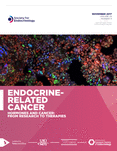Rapidly changing endocrine oncology research: personal reflection of the past, present and future times
- Experimental Urology, Department of Urology, Innsbruck Medical University, Anichstrasse 35, A-6020 Innsbruck, Austria
- Correspondence should be addressed to Z Culig; Email: zoran.culig{at}i-med.ac.at
After 20 years in prostate cancer research, this may be a good opportunity to critically re-analyse past and present times, and to understand that many personal interactions occur as a consequence of events that are non-science-related. For a young researcher who originates from a family with no medical background, such as mine, it has been perhaps easier to develop novel concepts in a research field, which I selected during medical studies on the basis of an interest in hormone action.
My research philosophy in the 90s was, perhaps typically for a European, strongly influenced by initial contacts in the US scientific conferences in North America, which also attracted many people from the world of business and politics. In fact, one of the events that opened new perspectives in research to me was a conference organized by the National Institutes of Health in Washington DC in a US national historical landmark, the hotel Mayflower. There was not only science but also a special atmosphere reminiscent of the old world of the 19th century, which made this conference so memorable. As a speaker, I had the opportunity to interact with many leaders in the field, such as Donald Tindall and Leland Chung, during my earlier research activities. Meetings of CaP CURE (now the Prostate Cancer Foundation) in the unique atmosphere of Lake Tahoe followed. It was very unusual to see that political and government organizations, which in the ‘Old Continent’ would not normally be involved in research, became partners in a selection of scientific projects, thus providing active support. From today's perspective, this period could be seen as a time of great enthusiasm. America wanted to learn more about devastating diseases and had a natural optimism that a cure was possible. Although it may be difficult to see a clear connection, I …












